Ineos and Wintershall Dea in “CCS First”
By 2030, Project Greensand aims to store up to 8 million tonnes of CO2 per year — an estimated 40% of Denmark’s total emission reduction target — in this area while continuing to make significant contributions to the understanding and growth of carbon storage technology.
Speaking at the inauguration ceremony in Esbjerg, Ineos chairman Jim Ratcliffe called the action “a breakthrough for carbon capture and storage,” while Hugo Dijkgraaf, chief technology officer at Wintershall Dea , said that “as a viable way to permanently store CO2 emissions under the North Sea, CCS has a crucial role to play in reaching net zero emissions in Denmark, Europe and beyond.”
The European Commission estimates that the EU will need to store up to 300 million t of CO2 per year by 2050 to meet its climate goals. Also speaking at the event, Commission president Ursula von der Leyen called the successful trial injection “a big moment for Europe’s green transition, and for our clean tech industry. “
Consortium members of Project Greensand, which is supported by the Danish state through the Energy Technology Development and Demonstration Program (EUDP), come from business, academic and government organizations with expertise in carbon capture and storage. Denmark regards CCS as a key technology in reaching its 2045 net zero emissions target.
The CO2 injected into the Nini field is being stored at a depth of about 1,800 meters below the seabed and will be closely monitored. Ineos and Wintershall Dea said they are leveraging two decades of experience from oil production in the Nini West field and have “extensive knowledge” of the reservoirs being used.
According to the Global CCS Institute, there are currently 197 CCS projects being pursued on a commercial scale globally. Most of the operational projects inject CO2 into the subsoil with the purpose of enhanced oil recovery (EOR).
Only one of the nearly 200 total, the Weyburn-Midale project, transports CO2 across national borders, in this case via a pipeline from the US to Canada. This project is also dedicated to enhanced oil recovery.
Only nine projects with dedicated geological storage purpose are operational, Global CCS says, and none up to now carries the sole purpose of storing to mitigate climate change, the Greensand backers say.
The Geological Survey of Denmark and Greenland (GEUS) estimates that there is potential to storing 22 Gt CO2 in the Danish subsoil, equal to roughly 700 years of Danish CO2 emissions at current levels.
Ineos Energy has tapped engineering contractor Kent to conduct screening studies for Project Greenspan covering the CCS Value Chain from the onshore capture sites, liquefaction, onshore storage, transportation and offshore sequestration.
Kent said the project adds to its portfolio in carbon capture and decarbonization and brings together their multi-disciplinary capability in process and facilities, subsea and pipelines, flow assurance, naval architecture and materials and corrosion.
Author: Dede Williams, Freelance Journalist





